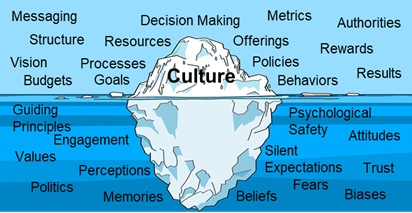In our current society, with typically more to do than time to do it in, many people have settled into a routine of merely reacting to what comes at them. They have become mentally programmed to just respond to requests with little thought given to pursuing their own agendas. Whether at work or home, rather than be intentional about what they do, they essentially let their world dictate what to do.
If you want to establish a desirable culture that enables your team, company, or family to achieve its strategies and goals, anything and everything might deserve your attention. This includes what is observable, like the top of an iceberg, but also what is hidden which is often even more substantial.





